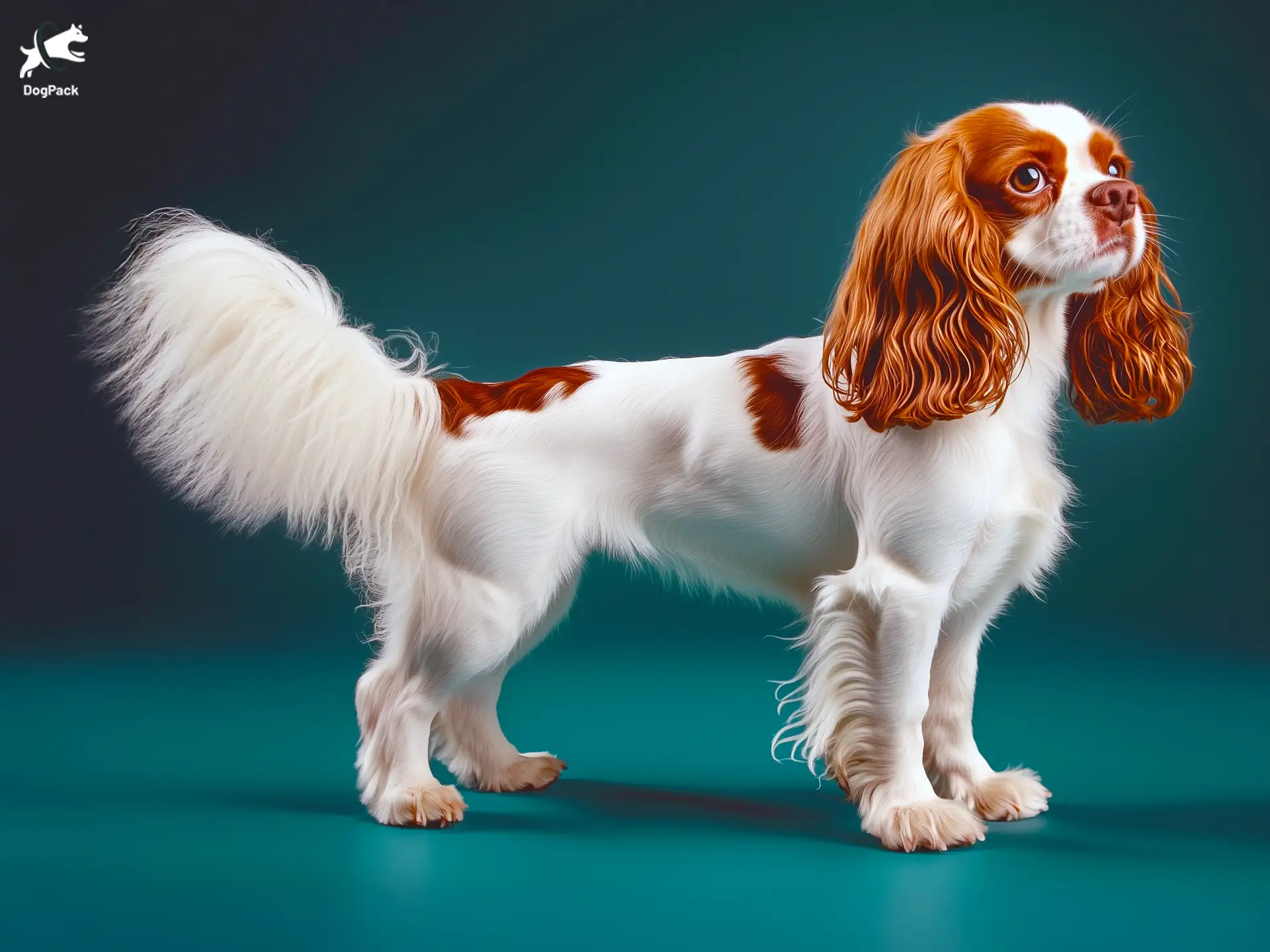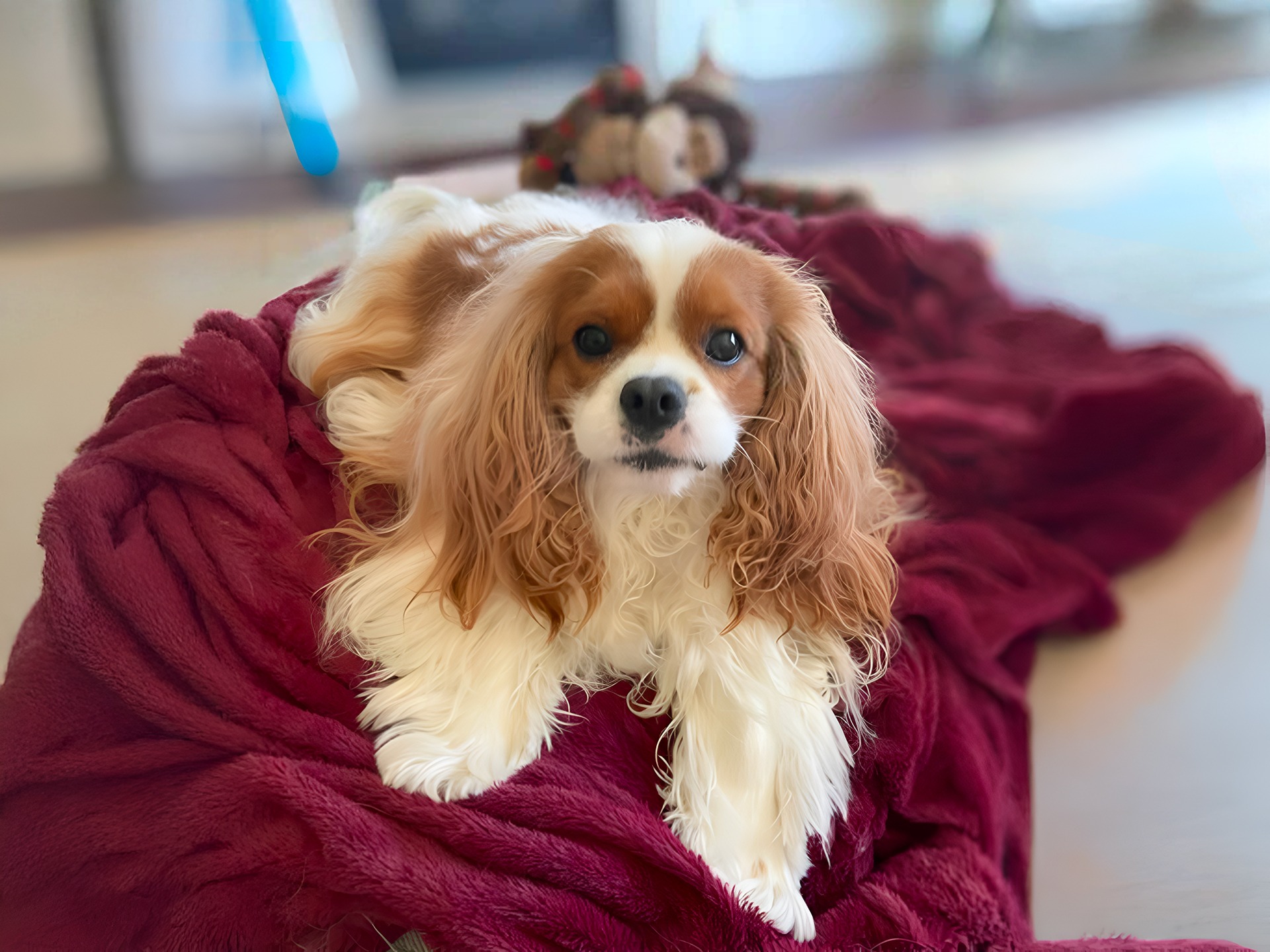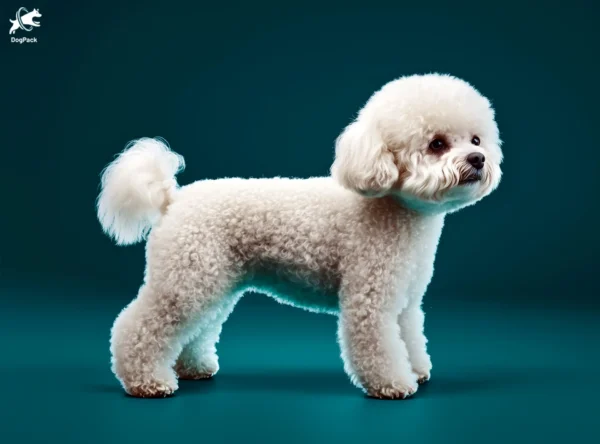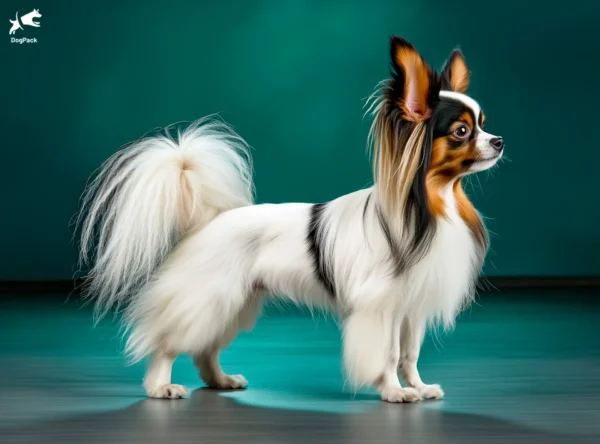Cavalier King Charles Spaniel Dog Breed Info & Overview
The Cavalier King Charles Spaniel embodies both royal elegance and boundless affection. Known for their gentle nature, soulful eyes, and luxurious silky coat, these small dogs make devoted companions. With a heart full of love, they adapt effortlessly to any lifestyle, whether snuggling on the couch or frolicking in the park. The Cavalier truly brings warmth and charm to every moment.
Characteristics
Pictures
Breed History
The origins of the Cavalier King Charles Spaniel trace back to the 17th century when they were cherished companions of British royalty. These dogs were particularly favored by King Charles II, who was rarely seen without his beloved spaniels by his side. Their regal heritage is evident in their graceful demeanor and affectionate nature.
Initially bred as lapdogs, Cavalier King Charles Spaniels were also used for warming laps during chilly carriage rides. Over time, they evolved from royal lap warmers to cherished family pets. The breed underwent a revival in the 1920s when enthusiasts sought to recreate the classic toy spaniel depicted in old paintings.
By selectively breeding for specific traits, fanciers re-established the breed’s distinct appearance, including its long ears and gentle expression. The Cavalier King Charles Spaniel was officially recognized by the Kennel Club in 1945, solidifying its place in canine history. Today, they continue to win hearts worldwide with their endearing charm.
Temperament, Personality
If you’re searching for a dog with a heart as big as their eyes, the Cavalier King Charles Spaniel might be your perfect match. This breed is renowned for its affectionate and gentle nature, making them excellent companions for people of all ages. They thrive on human interaction and are known to form deep bonds with their families.
Cavaliers are equally happy curling up on the couch or playing fetch in the backyard. Their adaptability means they can fit into various lifestyles, whether you live in a bustling city apartment or a quiet countryside home. They’re also known for their friendly disposition towards strangers and other animals.
Early socialization helps Cavalier King Charles Spaniels become well-rounded pets, although their innate friendliness usually makes this process a breeze. They’re not typically aggressive or shy, which makes them great for first-time dog owners. Their eagerness to please and love for companionship truly set them apart.
Physical Characteristics
The Cavalier King Charles Spaniel is a small, elegant dog with a silky, medium-length coat that comes in four distinct color combinations: Blenheim, Tricolor, Black and Tan, and Ruby. Their large, round eyes give them a gentle, soulful expression that melts hearts instantly.
One of the most notable features of the Cavalier is their long, feathered ears, which frame their face beautifully. They have a slightly rounded head with a full muzzle and a well-proportioned body. Despite their small size, they possess a sturdy build that reflects their sporting spaniel heritage.
Their tail is usually carried happily, wagging to express their friendly nature. Regular grooming helps maintain their luxurious coat, preventing tangles and matting. Overall, their appearance exudes a combination of grace and friendliness, making them as attractive on the outside as they are on the inside.
Health Issues
Like all breeds, the Cavalier King Charles Spaniel is prone to certain health conditions. One of the most common issues is mitral valve disease, a heart condition that can develop as they age. Regular veterinary check-ups are crucial for early detection and management of this condition.
Syringomyelia is another concern for Cavaliers, a neurological condition caused by a malformation of the skull. Symptoms can include sensitivity around the neck and shoulders. Early diagnosis and treatment can improve the quality of life for affected dogs.
Hip dysplasia and eye conditions like cataracts can also occur in Cavalier King Charles Spaniels. Responsible breeders screen for these health issues to minimize their occurrence. Maintaining a healthy weight and providing proper nutrition can also help mitigate some of these health risks.
Grooming Needs
Maintaining the Cavalier King Charles Spaniel’s gorgeous coat requires regular grooming. Brushing their silky fur at least three times a week helps prevent tangles and matting. A slicker brush or comb works well to keep their coat in top condition.
Bathing your Cavalier is recommended once a month or as needed, using a gentle dog shampoo to preserve their skin’s natural oils. Pay special attention to their ears, as the long, feathered hair can trap dirt and moisture, potentially leading to infections.
Regular nail trimming and dental care are also important parts of a Cavalier King Charles Spaniel’s grooming routine. Brushing their teeth several times a week can help prevent periodontal disease. Overall, while grooming is moderately time-consuming, it offers a wonderful opportunity to bond with your pet.
Exercise Requirements
While they may look like lapdogs, Cavalier King Charles Spaniels do enjoy regular exercise. A daily walk of 30 to 60 minutes is usually sufficient to keep them happy and healthy. They also appreciate playtime in a secure area where they can explore and satisfy their spaniel instincts.
Interactive games like fetch or even basic agility training can be both fun and mentally stimulating for your Cavalier. Despite their moderate energy level, they are adaptable and can adjust to their owner’s lifestyle, making them suitable for both active individuals and those who prefer a slower pace.
However, it’s important not to over-exercise your Cavalier King Charles Spaniel, especially in hot weather, due to their risk of heart conditions. Always monitor your dog’s response to activity and consult with a veterinarian to tailor an exercise regimen that’s appropriate for them.
Training Tips
Cavalier King Charles Spaniels are known for their eagerness to please, which generally makes training a positive experience. Positive reinforcement techniques work best, as they respond well to praise, treats, and affection. Harsh training methods can be counterproductive and damage their sensitive nature.
Early socialization and basic obedience training are recommended for your Cavalier to ensure they grow into well-mannered adults. They’re intelligent and can excel in activities like obedience and rally competitions. Consistency and patience are key to successful training sessions.
House training might require some patience with a Cavalier King Charles Spaniel, but with a regular schedule and positive reinforcement, they will catch on. Remember, short and engaging training sessions are more effective than long, drawn-out ones. Keeping things fun will help maintain their interest and enthusiasm.
Nutrition, Diet
Feeding your Cavalier King Charles Spaniel a balanced diet is crucial for their overall health, especially considering their predisposition to heart conditions. Due to their small size, they require high-quality dog food formulated for small breeds, rich in nutrients but moderate in calories.
Portion control is vital, as Cavaliers are prone to obesity, which can exacerbate heart issues like mitral valve disease. Typically, they need about 1 to 1.5 cups of dry kibble per day, divided into two meals. Opt for foods that contain omega-3 fatty acids to support heart health.
Consult your veterinarian to tailor a diet plan suited to your Cavalier’s specific needs, possibly including a low-sodium diet to benefit their cardiovascular system. Avoid giving them table scraps or high-fat treats, as this can contribute to weight gain and digestive issues. Providing fresh water at all times is also essential for their well-being.
Adoption, Breeders
If you’re considering adding a Cavalier King Charles Spaniel to your family, it’s important to find a reputable breeder or consider adoption. Responsible breeders perform health screenings to reduce the risk of genetic conditions prevalent in the breed.
Ask breeders for health clearances for both puppy’s parents, particularly for heart and neurological conditions. Visiting the breeder’s facility can give you insight into how the puppies are raised and socialized. The American Cavalier KingCharles Spaniel Club is a valuable resource for finding reputable breeders.
Adoption is another wonderful option. Organizations like Cavalier Rescue USA specialize in rehoming Cavaliers in need of a loving family. Adopting an adult Cavalier King Charles Spaniel can be rewarding and gives a second chance to a dog in need.
Family Pet?
The Cavalier King Charles Spaniel is an excellent choice for families. Their gentle and affectionate nature makes them wonderful companions for children. They are patient and enjoy playing, but always supervise interactions between dogs and young kids to ensure everyone’s safety.
Cavaliers generally get along well with other pets, including dogs and even cats. Their friendly disposition means they’re unlikely to start conflicts, making them a harmonious addition to multi-pet households.
Due to their strong desire for companionship, Cavalier King Charles Spaniels don’t like being left alone for long periods. They thrive in environments where someone is around most of the time, making them ideal for families who can provide ample attention.
Right For You?
Deciding if this breed is right for you involves considering your lifestyle and what you can offer. If you’re looking for a loving, adaptable companion who enjoys both playtime and cuddles, they could be a perfect fit.
These dogs are well-suited for individuals and families who can spend quality time with them. They do best in homes where they are not left alone for extended periods, as they crave human interaction.
If you’re prepared to commit to their grooming and health care needs, including regular vet visits for potential heart screenings, the Cavalier King Charles Spaniel may be the ideal addition to your life.
Conclusion
Embracing a Cavalier King Charles Spaniel into your home means welcoming a dog with a heart full of love and a spirit that brightens every day. While they require some attention to grooming and potential health considerations, the rewards are immeasurable. Their ability to adapt to different lifestyles, combined with their friendly disposition, makes them a wonderful choice for many. If you’re ready to provide the affection and care they need, you’ll find a devoted companion in this charming breed.
FAQs
-
Why are Cavalier King Charles Spaniels known for their gentle temperament?
Cavalier King Charles Spaniels were bred as companion dogs, inheriting a naturally gentle and affectionate nature. This makes them excellent lap dogs, forming strong bonds with their families and showing a patient demeanor.
-
Are Cavalier King Charles Spaniels prone to separation anxiety?
Yes, Cavalier King Charles Spaniels can be prone to separation anxiety due to their strong attachment to people. Gradual alone-time training and providing comforting toys can help manage this trait.
-
How well do Cavalier King Charles Spaniels tolerate cold weather?
With their single-layer coat, Cavalier King Charles Spaniels can be sensitive to cold weather. They may need a dog jacket for warmth during winter walks and should avoid extended exposure to freezing temperatures.
-
Are Cavalier King Charles Spaniels prone to any specific health issues?
Cavaliers can be prone to certain health issues, including heart conditions like mitral valve disease and joint issues. Regular vet check-ups and a healthy lifestyle help monitor and manage these concerns.
-
What type of exercise do Cavalier King Charles Spaniels enjoy most?
Cavaliers enjoy moderate exercise like daily walks, playtime, and interactive games. They are versatile and adapt well to both indoor play and outdoor activities, making them suitable for various lifestyles.
Breed Ratings
The Cavalier is quite intelligent and eager to please, making training relatively straightforward and enjoyable.
This breed loves to play and enjoys interactive games, making them delightful companions for both children and adults.
They have a moderate energy level, requiring regular exercise but also appreciating downtime cuddling with their owners.
Cavaliers shed moderately throughout the year, so regular brushing helps manage loose hair and maintain a healthy coat.
With hunting ancestry, they may chase small animals, but their prey drive is generally low compared to other breeds.
Their silky coat requires regular grooming to prevent tangles and matting, so they are moderately high-maintenance in this area.
Eager to please and intelligent, Cavaliers respond well to positive reinforcement and are generally easy to train.
They prefer company and may experience separation anxiety if left alone for long periods; they’re best with someone around.
Not excessive barkers, they may alert you to visitors but are generally quiet and well-mannered.
Drooling is minimal with this breed, making them a good choice for owners who prefer a cleaner home environment.
Cavaliers are very sociable with other dogs and enjoy canine companionship, making them great additions to multi-dog households.
They have some breed-specific health concerns like heart issues, so regular veterinary care is essential for maintaining health.






















